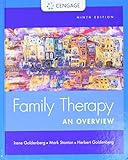Family therapy : an overview / Irene Goldenberg, Mark Stanton, Herbert Goldenberg.
Material type: TextPublisher: Boston : Cengage Learning, [2017]Edition: Ninth editionDescription: xxviii, 531 pages : illustrations, portraitsContent type:
TextPublisher: Boston : Cengage Learning, [2017]Edition: Ninth editionDescription: xxviii, 531 pages : illustrations, portraitsContent type: - text
- computer
- online resource
- 1305092961 (student edition)
- 1305866398 (loose-leaf edition)
- 9781305092969 (student edition)
- 9781305866393 (loose-leaf edition)
- RC488.5 .G64 2017
- RC488.5 .G64 2017
- WM 430.5.F2
| Item type | Current library | Call number | Status | Date due | Barcode | |
|---|---|---|---|---|---|---|
| E-Resources | Main Library E-Resources | 616.891 G618 (Browse shelf(Opens below)) | Available | E00137 |
Browsing Main Library shelves, Shelving location: E-Resources Close shelf browser (Hides shelf browser)
Includes bibliographical references and index.
Includes bibliographical references and indexes
Part I. Fundamentals of family psychology -- Adopting a family relationship framework -- Family development: continuity and change -- Diversity in family functioning -- Systems theory and systemic thinking -- part II. The development and practice of family therapy -- Origins and growth of family therapy -- Professional issues and ethical practices -- part III. The established schools of family therapy -- Psychodynamic models -- Transgenerational models -- Experiential models -- The structural model -- Strategic models -- Behavioral and cognitive-behavioral models -- part IV. New directions in family therapy -- Social construction models I: solution-focused therapy and collaborative therapy -- Social construction models II: narrative therapy -- Population-based family treatments -- part V. Clinical research: the synergy of science and practice -- Evidence-based family therapy -- part VI. -- Family theories and family therapies: a comparative assessment -- Comparative view of family theories and therapies.
Completely up-to-date, this engaging and practice-oriented text is your complete resource to help students master the many facets of family therapy. In this ninth edition, the authors provide practice-oriented content in a more concise format that will help students become empathic and effective family therapists. New material focuses on how students can practice systemic thinking and on how to develop core competencies in family therapy. There is also increased attention to LGBTQ families and alternative forms of family life, and to gender, culture, and ethnic considerations. Color-coded boxes highlight key aspects of family therapy, such as family diversity, evidence-based practice research, "Thinking Like a Clinician" student exercises, case studies, clinical notes, and therapeutic encounters. Examples illustrate family therapists from many professions, including social work, MFT, psychology, and counseling. Learning objectives focus students' attention on key concepts.
There are no comments on this title.








